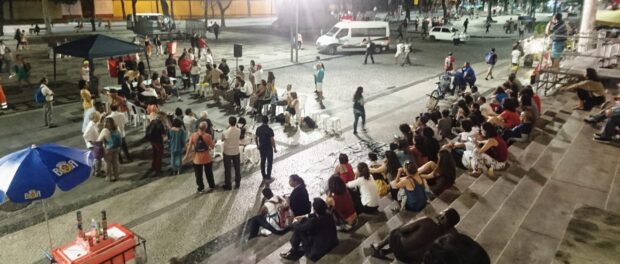
Last Friday, March 24, Urban League Cooperative and others organized a public teach-in on Provisional Measure 759/2016 (MP 759). MP 759, published last December, is a presidential decree stated to facilitate land regularization by easing registration of informal housing and land. On first glance, the Measure appears beneficial to low-income Brazilians living in informality, as it subsidizes regularization fees for low-income individuals and creates a direito a laje, particularly applicable to favelas where people will be allowed to receive separate titles for separate parts of the same structure. On second glance, however, a number of grave concerns, particularly for Brazil’s low-income population, become apparent. Friday’s teach-in hoped to bring this to light.
Panelists for the teach-in included housing specialist and urbanist Regina Bienenstein of the Fluminense Federal University (UFF), Luis Cláudio Vieira from the state agency responsible for land regularization and titling or Institute for Lands and Cartography of the State of Rio de Janeiro (ITERJ), law professor specialized in favela law Rafael Mendonça from the Institute for the Critical Study of Law (IECD), and public defender Adriana Britto from the Land and Housing Nucleus (NUTH) of the Rio de Janeiro Public Defenders Office. After the panelists presented on issues they have identified with respect to MP 759, members of the audience were invited to speak about how the law would affect them.

Critics of MP 759 are up in arms because the measure, taken unilaterally by Brazil’s unelected interim President Michel Temer, revokes rights won by movements for urban and rural land reform over decades. The most important of these rights is enshrined in Brazil’s 1988 Federal Constitution. In it, the social function of both urban and rural property, are guaranteed. Article 5, Section 23 of MP 759, however, threatens this social function of property by creating a huge opportunity to move lands from public to private ownership. Professor Bienenstein and Attorney Britto emphasized this in their comments on the panel.
Bienenstein explained that “the Provisinoal Measure facilitates the regularization of Areas of Special Social Interest.” Zones of Special Social Interest (ZEIS) are federally stipulated in Brazil’s Law 11977/2009 requiring cities to designate areas, known in Rio as Areas of Special Social Interest (AEIS), in their urban plans. According to the law these areas are “primarily intended to provide housing to low-income people and subject to specific rules for land division, use, and occupation” [Art. 7, section III].
Law 11977 provided protections for ZEISs, effectively creating a legal tool for the preservation of favelas as low-income housing even as they develop. When clicking on Brazil’s federal website to view the law today, however, one sees the entire section of the originally groundbreaking law scratched out, with “Revoked by Provisional Measure 759 of 2016” on every line.
MP 759 affects ZEISs in two ways. First, it repeals the majority of Law 11977, including provisions about ZEISs. Second, MP 759 facilitates individual land titles. Much of the land that has constituted or would have qualified for designation as a ZEIS was occupied public land. Therefore, should those residents use MP 759 to obtain private ownership, they will lose any remains of the ZEIS protections. And, should future lawmakers seek to return to a regime that protects ZEISs, it will be difficult for them to do so if more land is held privately.

Attorney Rafael Mendonça explained the argument for the unconstitutionality of MP 759. Beyond possible violations of constitutional guarantees of the social function of property, Mendonça argued that MP 759 itself was enacted unconstitutionally because it violates constitutional provisions giving the president authority to issue provisional measures.
Article 62 of the 1988 Federal Constitution states that “in relevant and urgent cases, the President of the Republic will be able to adopt provisional measures, with the force of law, and must immediately submit them to the National Congress.” Mendonça explained that MP 759 addresses four topics: urban, rural, and Amazonian land regularization, and transference of land ownership from the state to the individual. All four of these topics, however, were already addressed in existing laws, so President Michel Temer lacked the element of urgency necessary to trigger authority to enact a provisional measure.

Members of the audience who spoke after the panelists echoed concerns that MP 759 would facilitate the movement of property from public to private ownership, threatening the permanence of favelas. To them, MP 759 is another way to bring property into an already unfair and unequal private market.
A handout distributed with the class summarized some arguments against MP 759:
- “There is no justification for urgency, because Brazil has advanced legislation in this field;
- MP 759 causes enormous legal confusion by repealing legal provisions and replacing them with others that are not automatically applicable, thereby granting enormous discretionary authority with respect to the numerous Executive Branch regulations necessary to effectuate MP 759; and
- These impose higher taxes on the low-income population affected by the repeal of land regularization provisions that will now depend on new regulations in order to have continuity throughout Brazil.”

